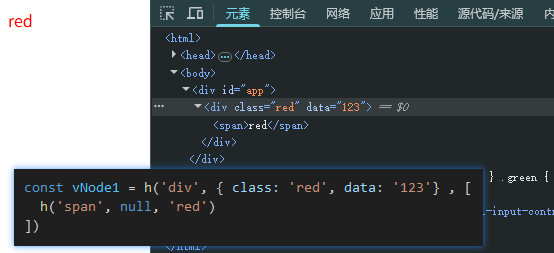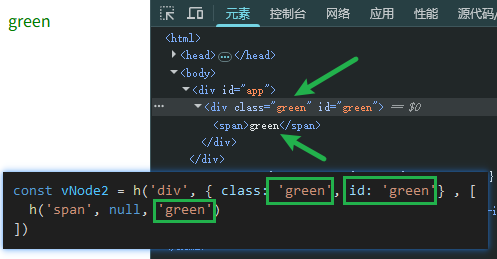实现patch函数
练习
html
<script>
// 已省略其他代码
function mount(vNode, container) {
const { tag, props, children } = vNode
// 注意:mount做了以下修改
// 将el保存在每一个vNode中,方便后续更新DOM时使用
const el = vNode.el = document.createElement(tag)
if(props) {
for(const key in props) {
const value = props[key]
el.setAttribute(key, value)
}
}
if(children) {
if(typeof children === 'string') {
el.textContent = children
} else {
children.forEach(child => {
mount(child, el)
})
}
}
container.appendChild(el)
}
function patch(n1, n2) {
// TODO
}
const vNode1 = h('div', { class: 'red'} , [
h('span', 'red')
])
const vNode2 = h('div', { class: 'green'} , [
h('span', 'green')
])
patch(vNode1, vNode2)
</script>patch前:

patch后:

答案:
html
<div id="app"></div>
<style>
.red { color: red; }
.green { color: green; }
</style>
<script>
const vNode1 = h('div', { class: 'red', data: '123'} , [
h('span', null, 'red')
])
const vNode2 = h('div', { class: 'green', id: 'green'} , [
h('span', null, 'green')
])
function h(tag, props, children) {
return {
tag,
props,
children
}
}
function mount(vNode, container) {
const { tag, props, children } = vNode
const el = vNode.el = document.createElement(tag)
if(props) {
for(const key in props) {
const value = props[key]
el.setAttribute(key, value)
}
}
if(children) {
if(typeof children === 'string') {
el.textContent = children
} else {
children.forEach(child => {
mount(child, el)
})
}
}
container.appendChild(el)
}
mount(vNode1, document.querySelector('#app'))
function patch(n1, n2) {
// tag
if(n1.tag === n2.tag) {
const el = n2.el = n1.el
// props
const oldProps = n1.props
const newProps = n2.props
for(const key in newProps) {
const oldValue = oldProps[key]
const newValue = newProps[key]
if(oldValue !== newValue) {
el.setAttribute(key, newValue)
}
}
for(const key in oldProps) {
if(!newProps[key]) {
el.removeAttribute(key)
}
}
// children
const oldChildren = n1.children
const newChildren = n2.children
if(typeof newChildren === 'string'){
if(typeof oldChildren === 'string') {
if(oldChildren !== newChildren) {
el.textContent = newChildren
}
} else {
el.innerHTML = newChildrenValue
}
} else {
if(typeof oldChildren === 'string') {
newChildren.forEach(child => {
mount(child, el)
})
} else {
const oldLen = oldChildren.length
const newLen = newChildren.length
const commonLen = Math.min(oldLen, newLen)
for(let i = 0; i < commonLen; i++) {
// not optimized
// 潜在效率问题:相同的节点仍然会被进行比对
patch(oldChildren[i], newChildren[i])
}
if(newLen > oldLen) {
// 节点增加了
newChildren.slice(oldLen).forEach(child => {
mount(child, el)
})
} else if (newLen < oldLen) {
// 节点减少了
oldChildren.slice(newLen).forEach(child => {
el.removeChild(child.el)
})
}
}
}
} else {
// 暂不考虑该情况
}
}
patch(vNode1, vNode2) // 这句可以试着在控制台调用,直接看到更新效率
</script>